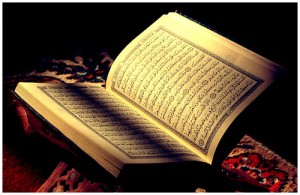…And I catch a cold. Seriously, I get sick maybe once a year and it happens on the first day of Islam AND Ramadan? I barely got any sleep last night (which is typical for the first of any month because of new religion jitters), but woke up at 4:30 this morning with a nasty sore throat and runny nose. Inshallah (God willing), this will not impede upon or slow down my efforts.
Anyway, assalamu alaikum (Peace be upon you) and Ramadan mubarak (Blessed Ramadan)!
This is a pretty special and unique month for Project Conversion. When planning my year of spiritual promiscuity, I arranged each month according to holidays for each faith. August is really cool because in Islam it is the holy month of Ramadan. So it’s not a holi-day, but a holi-month! Get it? Holi-month…?
Moving on.
To give you a brief background, Islam (according to Muslims) was the religion practiced by all the prophets from Adam, to Noah, to John the Baptist, Jesus, and finally Muhammad (peace be unto them all). Islam simply means “submission,” however in a more specific way, it is peace through submission to God’s will. Abraham is considered the patriarch and religious father of them all. Christians and Jews are considered “People of the Book.” We’ll dive into all of this later.
The month of Ramadan is special and particularly holy because this is the month in which the Qur’an was given to Muhammad (pbuh-peace be upon him) for recitation by Allah (God) via the angel Jibril (Gabriel). Ramadan is therefore the ninth month of the Islamic calendar year and the first day is recognized by spotting the new moon the evening before. During this month, Muslims (who are physically able) observe a fasting period between dawn and sunset where we abstain from food, water, sex, gossip, idle chatter, profanity, anger, and conflict. There is nothing holy about going hungry and thirsty without reason. Fasting during Ramadan serves two purposes:
- Increased empathy for the poor and starving. Charity and good will are one of the Five Pillars of Islam. By experiencing hunger and thirst during the day for Ramadan, we have a greater capacity to understand the plight of those suffering around us.
- A method of purification via self-control. Fasting is prescribed in many faiths as a way to separate ourselves from the mundane needs of the world and focus on the divine. Fasting during Ramadan is viewed as the path to increased blessings through holy and noble intension.
This first day of Ramadan for me is interesting because the sick are pardoned from taking the fast. I’m a tough cookie, so I think I can handle it, but my wife (who is a nurse) will undoubtedly nag me about fluid intake. We’ll see how it goes.
Other than fasting, one of the great practices of Ramadan is reading the Qur’an (which literally means “the recitation”) in its entirety. This is usually done in the evening after we break the fast and say evening prayers. The Qur’an is divided into 30 sections, so I should have no problem.
I have to admit, this month makes me nervous and has for some time. You would think that after seven months of nose-diving into different faiths that I would have this thing down, but when it comes to Islam…I don’t know. Like the Latter-day Saints, I have a history with Islam–a much darker one–that I am not proud of (more later). I also find the prayer (salat) techniques and the Arabic language very intimidating. My efforts this morning with the dawn prayer (Fajr) were horrible, so I hope Allah has a sense of humor and patience with me as I try to honor this practice.
So there is the foundation of this month. As you know, we will cover all of these topics in greater detail (complete with awkward photos) as we go. I simply wanted to introduce myself (Andrew Bowen in case you didn’t know) and, inshallah, I won’t make too much a fool of myself or the religion of 1.2 billion people this month as I explore Islam.
Assalamu alaikum

